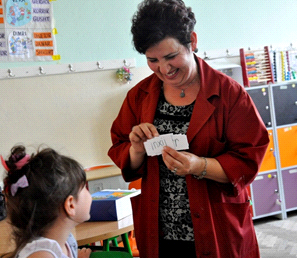
August 2015—Thousands of primary school teachers in Kosovo are learning how to instruct their students more effectively and to rapidly determine if the lessons are being absorbed.
Valentina Cermjani has been a primary school teacher in Kosovo for 19 years. Until last year, she worked in a village school, 10 kilometers from the city of Gjakovë/Djakovica, much of which was destroyed during the Balkan conflicts of the 1990s.
Cermjani has always wanted to be a better teacher and attended many training courses. In 2012, she was nominated by her colleagues to become a school facilitator in a new Assessment for Learning course, organized by USAID’s Basic Education Program. When she was invited to the course, she didn’t know it would change the way she taught.
“I thought the course would be about testing or grading,” said Cermjani.
Instead, she learned how to use simple teaching techniques that enable her to get quick feedback from her students and see if they understand the lesson. She also learned how to provide them with ways to check their own learning and that of their classmates. Previously, Cermjani could only determine student comprehension at a later stage, when they were tested or when they made a mistake. Assessment for Learning techniques enable her and her students to correct misunderstandings at an early stage.
“At first, the more able students resented having their work checked by other students. But when they saw that they must use fair and transparent criteria, they accepted the approach enthusiastically and treated the exercise seriously,” she said.
After the course, Cermjani received additional training from USAID and qualified as a school facilitator, enabling her to train teachers in her own and neighboring schools and act as a mentor to her colleagues.
“At first, they thought they already knew everything about assessment. But when they saw that the techniques were practical and could be applied in their everyday work, they became motivated,” said Cermjani about her colleagues. “They were like children, excited, telling each other what happened.”
Last year, Cermjani transferred to a larger city school. She has two children of her own, who attend the school. When asked what they think of the Assessment for Learning teaching approach, she replied, “They only talk about it and complain if a teacher does not use the techniques.”
As an internationally recognized approach to improving student learning, Assessment for Learning is being rolled out to every elementary school In Kosovo. To date, over 400 schools have been provided with at least one qualified assessment facilitator, and over 12,000 teachers have completed the course.
USAID's Basic Education Program, a partnership with the Kosovo Government, is designed to improve the quality of primary education by strengthening school management, school boards, and teachers’ and parents’ associations, and by providing professional development for teachers and school administrators. The program runs from August 2010 through July 2016.
LINKS
Follow @USAIDKosovo. on Facebook, on YouTube







Comment
Make a general inquiry or suggest an improvement.